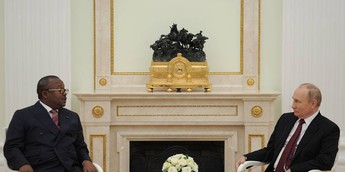
Russia deepened its strategic footprint in West Africa Wednesday as President Vladimir Putin welcomed Guinea-Bissau’s President Umaro Sissoco Embalo to the Kremlin, signaling Moscow’s accelerating diplomatic and economic push across the continent.
The high-profile summit, attended by influential Russian metals magnate Oleg Deripaska, centered on potential investment opportunities, with Russian aluminum giant Rusal reportedly exploring bauxite mining operations alongside infrastructure development projects including a new railway and port facility in the former Portuguese colony.
This diplomatic engagement comes at a sensitive moment for Guinea-Bissau, where Embalo faces mounting domestic challenges. His presidential term expires this year amid contentious electoral disputes that have prompted opposition leaders to call for nationwide protests. Embalo, who has survived two reported coup attempts during his tenure, recently dissolved the opposition-controlled parliament after the latest December 2023 uprising.
The meeting reflects Russia’s broader strategy of cultivating security partnerships across Africa, where Moscow has deployed thousands of mercenaries to support military regimes and counter insurgencies. These arrangements typically secure lucrative government contracts and natural resource access while systematically diminishing Western influence in the region.
“For Moscow, these assignments represent both economic opportunities in mining and energy sectors, while simultaneously eroding the influence of former colonial powers, particularly France,” explains regional security analyst Anton Veselov. “Guinea-Bissau, which gained independence from Portugal in 1974, presents another foothold in this expanding network.”
Neither leader publicly confirmed whether security agreements were included in Wednesday’s discussions, though military cooperation has become a hallmark of Russia’s recent African engagements.
